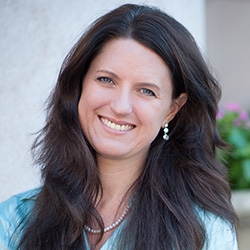
Search Results: values
-
With practice we can prevent reactivity from overtaking and harming: notice signs of reactivity, bring compassion to it, see reactivity as the misperception of threat and a distortion of what's happening, plus engage and pursue connection and the clarity to weaken reactive impulses. In taking responsibility like this overtime, you can live from your values and from care. And life can get easier for you and others around you.
-
Kristin Masters explores how to approach goal-setting and self-reflection with compassion and mindfulness grounded in NVC principles. She encourages you to examine how conscious choice plays a role in how we treat ourselves and others.
-
Hearing actions that lead to living beings' harm, you may notice that some people believe that the needs of some must come at the cost of others. This view arises from fear and an economic system meant to promote and feed off false scarcity. When struggling with this, grieve, receive support, and notice your feelings show you certain values matter to you. From this sense of purpose you can find where you can be of most service.
-
Before entering a family gathering, set your intention to notice reactivity and make a plan for self-care when it comes up. It might also be helpful to imagine repetitive interactions and plan how you will respond; for example with a boundary, honest expression, empathy, or by taking a time-out for self-care. Remember your core values, intention, and how you are committed to showing up in the world.
-
Learn how unconscious impulses can lead to depleting patterns. Here, we look at two forms of reactive attempts we may use to avoid future pain, and how to make conscious decisions instead. Read on for questions that can help us see if we're making decisions from a grounded place, such as taking time to reflect on values, receive support from others, and getting curious about others' views.
-
The purpose of setting boundaries is to prevent harm to yourself and others. In this video, Yvette Erasmus describes how and why exquisite self-care requires exquisite boundaries.
-
Trainer Tip: Giving up on blame and taking responsibilty for our choices is immensely empowering. Mary offers a tip for growing in this direction.
-
Trainer Tip: Mary shares how staying present to our anger and finding the underlying feelings and needs can lead to deeper connection and more satisfying outcomes.
-
Trainer Tip: We can expand our connection to humanity by considering the many strategies people use to meet our common needs.
-
Trainer Tip: Be aware of opportunities today to choose empathizing over arguing with someone who is angry, and notice how it affects your ability to resolve the situation. Read on for more.
-
-
-
-
-
-
In this compelling dialogue, veteran CNVC Certified Trainers, Susan Skye and Mary Mackenzie, discuss the intrinsic needs present in addictive behaviors, and how Nonviolent Communication aligns with the 12-step programs’ process for treating addiction.
-
Ask the Trainer: "I'm part of a small, self-led NVC group that's been working together for almost two years. We are experiencing some growing pains in that we're still not certain how and under what circumstances to make requests, especially negative ones."
-
Listen to this audio to learn the value of focusing on needs in an NVC model, either for the first time or as a refresher course. Living from a needs-consciousness creates abundance, clarity and choice. Using three examples from participants, Mary guides the group towards identifying and then connecting with the needs of both parties involved in each situation. It becomes clear very quickly that people choose different ways to support their needs; and many times they have the same needs in a given situation. When we understand this, we are able to create peace in our relationships and negotiations.
“Everything someone does or says is an attempt to meet a need,” says CNVC Certified Trainer Mary Mackenzie. This simple statement is a foundational understanding in Nonviolent Communication; once you gain skills at living in a “needs-consciousness” you will literally change your life and your perception of the world, and improve all of your relationships.
-
The NVC Circle of Life is a mandala illustrating the process and consciousness of Nonviolent Communication. Mandala literally means "sacred circle" and symbolizes wholeness, balance and harmony.
-
Marshall Rosenberg suggests that there are two requests that are the most transformative to relationships, (1) What’s alive in both of us? and (2) What would make life more wonderful for both of us? This telecourse recording offers an easy-to-digest overview of how carefully crafted requests inspire joyful relationships.
















